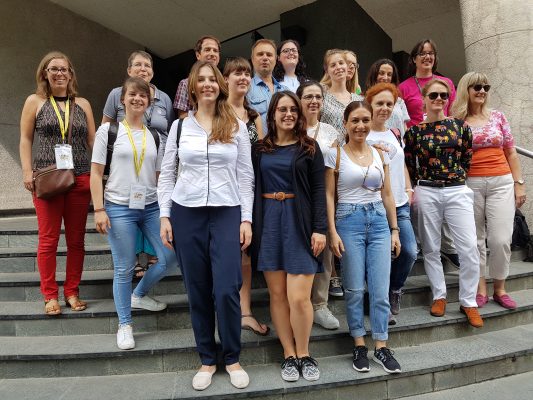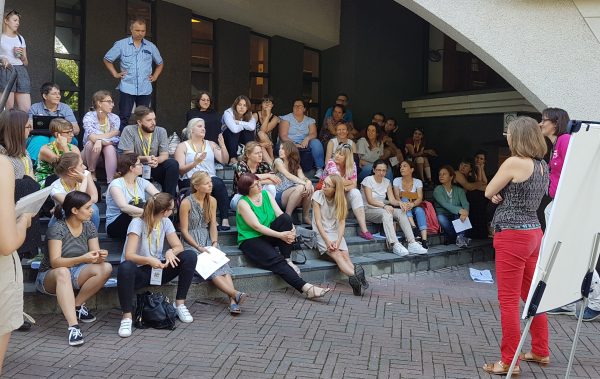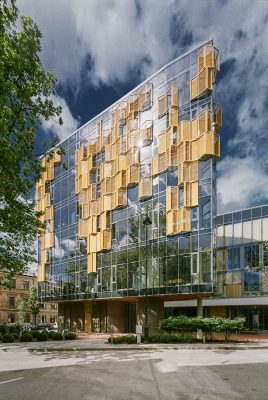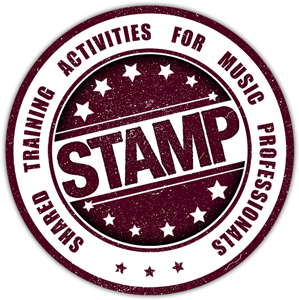The STAMP project had foreseen 3 workshops. Those worked as test runs for the project results and helped developing the tools.
STAMP Training for Trainers on YEMP
 How to organise a Youth Event Management Programme – YEMP
How to organise a Youth Event Management Programme – YEMP
Tallinn, Estonia / 19.07.2018-25.07.2018
The STAMP “Workshop for Trainers” was a training offer for festival organisers and music organisations from Central, East and South-Eastern Europe. In this workshop, YEMP (Young Event Management Programme), an existing training for young managers in the choral world, was presented as model training course that can be adapted to different realities and contexts. The workshop aimed at representatives of the STAMP partner organisations who wanted to learn how to organise a YEMP as a “win-win” model training for young managers, to understand what YEMP is, how it works and why it can be an interesting offer both for young managers and for festival organisers.
Participants in the workshop learned what is a YEMP and heard testimonials of previous YEMPers. They received a first draft of the YEMP guidelines developed in the frame of the STAMP project, as well as the toolbox for (young) managers and were invited to contribute to the further development of these documents. They were given the opportunity to actively participate in parts of the training course „YEMP“ (cf. below C2, e.g. role games, lectures on safety issues ). After the workshop, the participants transferred what they had learned to their own field of work: The Workshop for Trainers has motivated most of the STAMP partners to adapt the “YEMP” model to their own needs by offering specific training for the volunteers of their events in the future, which will offer capacity building and empowerment for youth and lead to a more efficient involvement of volunteers in the future.
The examples of how to adapt YEMP to different realities were added to the Guidelines (O2) for inspiration.
The organisations involved:
- Coordination STAMP: European Music Council
- Coordination YEMP: European Choral
Association – Europa Cantat - Hosting YEMP weekend and workshop for
trainers: Estonian Academy of Music and Theatre - Hosting YEMP: EUROPA CANTAT Festival
YEMP – On the Job Training
 The training course for event management YEMP (Young Event Management Programme) was a blended learning mobility ending with a two-week training course including lectures, interactive sessions and training on the job. After a selection process, 25 young people from different countries were invited to participate in the programme. Among these, 8 were proposed by STAMP partners. Special features in connection with STAMP were an intensive online preparation of the YEMP-participants which included a series of streamed webinars prepared in the frame of STAMP, a Webinar with the participants to introduce them to the project, a Facebook group and some online tasks.
The training course for event management YEMP (Young Event Management Programme) was a blended learning mobility ending with a two-week training course including lectures, interactive sessions and training on the job. After a selection process, 25 young people from different countries were invited to participate in the programme. Among these, 8 were proposed by STAMP partners. Special features in connection with STAMP were an intensive online preparation of the YEMP-participants which included a series of streamed webinars prepared in the frame of STAMP, a Webinar with the participants to introduce them to the project, a Facebook group and some online tasks.
The young YEMPers were integrated into a big festival team with roles of responsibility in the various offices of the festival, e.g. in the field of music planning, concert organisation, information services, communication and production. Two coaches offered guidance throughout this intense on-the-job training.
The training course included online tasks such as watching the Webinar 11 on international cooperation, participating in a preparatory Webinar, developing and answering several quizzes for mental preparation, as well as exchanging information on Facebook (joint Facebook group), a weekend of lectures and workshops on management skills and team-building, including safety issues for huge events, role plays to be prepared for challenging situations in the festival reality and stress management. 2 weeks of on-the-job training during the EUROPA CANTAT XX Tallinn 2018 offered the possibility to directly apply what had been learned and deepen it by concrete job experiences.
You want to know more about YEMP? Read the detailed guidelines on what is a YEMP, how it can be organised and how it can be adapted to different realities. In the annex you will find a toolbox for (young) managers.
Starting your Cooperation Project
September 4-8, 2017
Cesis, Latvia
Our aim was to help structure the music sector in every European country. Over the long term, this will help improve conditions for music professionals from local to European level, develop a vibrant European music scene, and grow audiences both locally and internationally.
The workshop is now available as Online Course ► Online Course on International Cooperation & Networking
Please find the summary of the workshop in Latvian here: “Starting your Cooperation Project” – Summary in Latvian
PROGRAMME AND CONTENTS
The programme involved two types of session:
INPUT SESSIONS were theory or practice presentations that provided all the information required to help the participants with their project development. They inspired and brought fresh perspectives. Speakers from all over Europe shared their stories, gave tips and gave the projects the final polish.
INTERACTIVE SESSIONS were work-in-progress periods dedicated to the project ideas, from the identification of challenges to shaping a methodology for the next steps. Participants shared their concerns and found solutions collectively with the rest of the participants under the supervision of experienced trainers.
Day 1 – INTRODUCTION
The first day was dedicated to getting to know each other and identifying the objectives and motivation of each participant. The group met in Riga for a visit of the Old Town and a tour in the Latvian Music Academy. The informal and “active” nature of the start of the workshop set the tone for the rest of the week fostering a friendly and open atmosphere among the participants. The participants and organisers took a group transfer to Cesis where the seminar was held in the Cesis Concert Hall. To introduce themselves and their project ideas, the participants created a poster wall and picked an animal picture, this is a method to easily connect between the participants and their project which they were working along further during the week.
Day 2 – EXPLORATION
The next day focused on the challenges of the participants with input how cooperation can be implemented. The day started off with a talk from Guna Zucika, manager of the popular Latvian band “Carnival Youth” in which she talked about the obstacles she faced in her career as a music professional from Eastern Europe and how she overcame them. Afterwards the participants discussed in smaller groups the obstacles they are facing themselves. Often it was not obvious for the participants to identify what is an obstacle for them or what his holding them back from going forward with their cooperation project. Talking and listening to the experts but especially their peers proved to be very valuable in getting a clearer picture. In the afternoon, Maia Sert from the cultural mobility information network “On the Move” provided a thorough overview of different models of networks or cooperation projects outlining the differences between networking, collaborating/coordinating and cooperating. Based on these 2 input sessions the participants worked in between independently in the interactive session. They formed groups of 3 or 4 and continued shaping their project ideas.
Day 3 – PROBLEM-SOLVING
On day 3 the participants received concrete training and methodologies on two of the most common challenges in the development of cooperation projects: data collection/mapping and funding. Three experts outlined the issues in their presentations and provided possible solutions and concrete examples of other projects. In interactive sessions in smaller groups with guidance of the experts the participants applied what they had heard on their project ideas.
Day 4 – ACTION PLAN
The Thursday was dedicated to putting the training of the previous days into action by adapting what the participants had gathered for their own project. The input sessions looked at tools and incentives in networks and other forms of cooperations as well as examples of how advocacy/policy work can be implemented on local level. The last interactive session of the day gave the participants the opportunity to individually work on their project idea. This assured a clear outcome and summary of their project idea to bring home to their peers.
Day 5 – WHAT’S NEXT?
The last day centred on evaluation and defining the next steps for the project ideas of the participants. The main objective for the final day of the seminar was to bring all the threads of the input sessions together in combination what the participants already implemented during the interactive sessions. The participants were challenged to do a short and precise presentation of their project idea only for the duration of a match burning down. Each presentation/project idea was discussed and evaluated by the peers and the organisers. This method was a very helpful and visible method to show how far the participants had come within their workshop from their first short presentation of their idea to the final day.
19 Participants from 12 countries
The 5-day workshop brought together 19 participants from 12 countries to help them develop their own cooperation project. The participants came to the seminar with a draft idea of their project and left with an action plan for future cooperation.
One result of the workshop – which was unexpected – was that the participants started working on project ideas with each other, that were developed during the workshop. Just shortly after the workshop, we knew of two collaborations that were under way (Armenian/Austrian) and (Czech/Dutch) and acomplished one year after the workshop!
The response and evaluation of the seminar was very positive.
If you want to get in touch with us, please contact Audrey Guerre, Live DMA, at audrey.guerre[at]live-dma.eu



